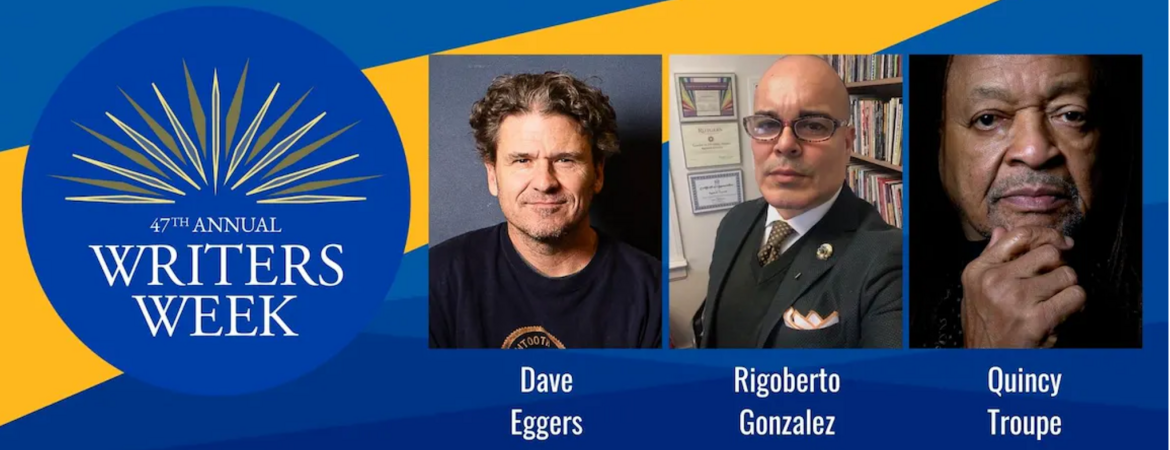College of Humanities, Arts, and Social Sciences

UC Riverside has kicked off the 47th annual Writers Week festival, the longest-running free literary celebration in California, held Feb. 10 and Feb.12-16. Co-sponsored by UCR’s Department of Creative Writing and a number of on- and off-campus partners, Writers Week includes in-person and virtual events such as readings and panels and will be joined by established and emerging writers.
“Writing is a famously lonely profession, and writers’ festivals like this are important places for writers to mingle and hear and see each other, and important places for them to meet and hear from readers,” said Tom Lutz, Distinguished Professor of Creative Writing and founding editor-in-chief of the LA Review of Books (LARB). Lutz also serves as the co-director of Writers Week alongside Distinguished Professor of Creative Writing Allison Hedge Coke.
This year’s Writers Week will feature a post-festival ticketed celebration in Los Angeles sponsored by LARB honoring the Lifetime Achievement Award honorees on Feb. 16, The UCR celebration will be held in the Interdisciplinary (INTS) Building room 1128 with a virtual screening option.
The 2024 Lifetime Achievement Award honorees are Rigoberto González, whose work contributes to the Latino community, Dave Eggers, writer and founder of the literary journal McSweeney’s and literacy project 826 Valencia, and Quincy Troupe, a writer who has been involved in the Black Arts Movement and Watts Writers Workshop.
“These three writers are exemplars of what we see as truly engaged literary citizenship,” Lutz said. “All three write in multiple genres, and they have together produced over a hundred books.”
Recipients of the award are selected by UCR professors in collaboration with LARB editorial staff. 2024 honoree González is also a UCR alumnus and graduated in 1992 with a bachelor’s in humanities and social sciences interdisciplinary studies.
“There is something very special about having Rigoberto, a UCR undergraduate, come back to accept the Lifetime Achievement Award,” Lutz said.
According to González, Writers Week was where he first realized that writers were real human beings and not just names on a book cover and was able to shorten the distance between them with readers.“When I came across the list of previous recipients, most of them my heroes, I was overjoyed that my work as a literary advocate had been deemed worthy of measuring up to the contributions of such giants as Sandra Cisneros, Juan Felipe Herrera, and John Rechy,” González said.
As in González’s case, Writers Week serves as an opportunity for undergraduate and graduate students to interact with writers, both in-person and online. For writers, the literary festival is a place to reach and connect with readers.
“There’s value in creating a space in which a dialogue can take place between those who write the words and those who encounter them,” González said. “These spaces are also important to writers like me who see allies in my fellow writers in the struggle against censorship, prejudice, misinformation, and the many other ills that currently afflict our society.”
“Public readings and other literary events have long been a prime method for writers to reach readers, and now more than ever it is a necessary part of a writer's career,” Lutz said.
The remaining events of the festival will be offered in various sessions at differing times from Feb. 12-16. All virtual events will be captioned & ASL translated and in-person events will be held in INTS 1128 with virtual screening options.
“There is not a dull moment in the program,” Lutz said. “People should read through the schedule and attend as many events as possible.”
To view the 2024 Writers Week schedule, please visit writersweek.ucr.edu/schedule2024
To register for an online session, please visit crowdcast.io/@ucr-writers-week